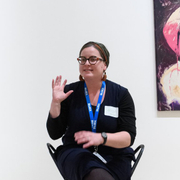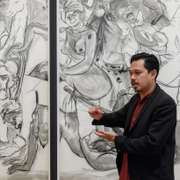- Level Foundation
- Duration 12 hours
- Course by The Museum of Modern Art
-
Offered by

About
Explore how to integrate works of art into your classroom with inquiry-based teaching methods originally developed for in-gallery museum education.Modules
Introduction to the Course
1
Videos
- Welcome to Art and Inquiry
1
Readings
- Welcome to the Course!
Introduction to Inquiry
1
Videos
- Why Engage in Inquiry Around Art?
2
Readings
- How to Start Using Inquiry, Art, and Social Emotional Learning
- Lisa Mazzola's Top Five Tips for Teaching with Works of Art
Review
1
Assignment
- Introduction to Art & Inquiry
5
Readings
- Review of Module 1
- Optional Readings & Additional Resources
- Optional Prompts for Discussion & Reflection
- Tell Us About You
- Are you a New York State educator?
Building Lessons with Close Looking
2
Videos
- Mindful Drawing
- Close Looking with Art
3
Readings
- Welcome to Module 2
- Consider: Mindful Drawing & Close Looking with Art
- Consider: Strategies for Close Looking
Building Lessons with Open-Ended Inquiry
1
Videos
- Why use open-ended questions?
2
Readings
- Consider: Developing Open-Ended Questions
- Consider: Themes & Essential Questions
Review
1
Assignment
- Close Looking & Open-Ended Questions
3
Readings
- Review of Module 2
- Optional Readings & Additional Resources
- Optional Prompts for Discussion & Reflection
Introduction to Social Emotional Learning
2
Videos
- Art as a Tool for Social Emotional Learning (SEL)
- Introduction to Learning with MoMA Lessons
2
Readings
- Welcome to Module 3
- SEL Frameworks That Have Inspired Us
Lessons for Self-Awareness
2
Videos
- Lesson on Self-Awareness: Rirkrit Tiravanija
- Lesson on Self-Awareness: Carrie Mae Weems
1
Readings
- Lesson Links: Self-Awareness
Lessons for Social Awareness
2
Videos
- Shambhavi and Social Awareness
- Charles White and Social Awareness
1
Readings
- Lesson Links: Social Awareness
Lessons for Creating Community
2
Videos
- Lesson on Community: Frida Kahlo
- Lesson on Community: Helen Levitt
1
Readings
- Lesson Links: Community
Adapting Non-SEL Lessons
1
Videos
- Adapting Non-SEL Lessons
1
Readings
- Lesson Links: Adapting Non-SEL Lessons
Review
1
Assignment
- Art, Inquiry, and Social Emotional Learning
5
Readings
- Review of Module 3
- Optional Readings & Additional Resources
- Optional Prompts for Discussion & Reflection
- Mid-course survey
- Reminder: CTLE for New York State educators
Drawing and Writing As Inquiry
1
Videos
- Artist's Process | Preparatory Drawings
2
Readings
- Welcome to Module 4
- Consider: Drawing & Writing as Inquiry
Material Exploration As Inquiry
1
Videos
- Artist's Process: Weaving
1
Readings
- Consider: Material Exploration as Inquiry
Design Thinking As Inquiry
1
Videos
- Artist's Process: Designing & Re-Designing Everyday Objects
1
Readings
- Consider: Design Thinking as Inquiry
Review
1
Assignment
- Activities as Inquiry
3
Readings
- Review of Module 4
- Optional Readings & Additional Resources
- Optional Prompts for Discussion & Reflection
Making Connections Across Curriculum
2
Readings
- Welcome to Module 5
- Case Study: Ruth Asawa
Social Studies
1
Videos
- Ruth Asawa and Social Studies
1
Readings
- Suggested Curricular Connections: Art, Inquiry, and Social Studies
English Language Arts
1
Videos
- Ruth Asawa and English Language Arts
1
Readings
- Suggested Curricular Connections: Art, Inquiry, and English Language Arts
Science
1
Videos
- Ruth Asawa and Science
1
Readings
- Suggested Curricular Connections: Art, Inquiry, and Science
Reflect & Test Your Knowledge
1
Assignment
- Final Project: Design an Inquiry-Based Lesson
4
Readings
- Review of Module 5
- Optional Prompts for Discussion & Reflection
- End-of-course survey
- CTLE for New York State educators
Before You Go: Additional Teaching Resources
2
Readings
- MoMA Resources
- Virtual Event Recordings
Auto Summary
Discover innovative ways to enrich your classroom with the course "Art & Inquiry: Museum Teaching Strategies For Your Classroom." This engaging program, offered by Coursera, dives into the integration of art through inquiry-based teaching techniques commonly used by museum educators. It's a foundational course ideal for personal development, designed to inspire educators and enhance their teaching strategies. Led by experienced instructors, this course offers comprehensive content over a period that translates to approximately 720 minutes of learning. Learners can choose between Starter and Professional subscription options, making it accessible and flexible to fit various needs and schedules. Perfect for educators looking to bring a fresh and dynamic approach to their teaching, this course provides the tools and methods to foster a deeper appreciation of art in students while enhancing critical thinking and observational skills.

Larissa Raphael

Francis Estrada

Lisa Mazzola

